The 90th Minute Trailer from Jun Stinson on Vimeo.
The Football Scholars Forum is holding its final session of the 2012 season on Wednesday, December 5, at 3:30pm EST, on Jun Stinson’s short film, The 90th Minute. The 20-minute documentary follows three members of FC Gold Pride, the 2010 Women’s Professional Soccer champions. The film sheds light on what it’s like to be a female pro player in the U.S. — a dream that has become more elusive after the demise of the WPS.
Why do Hope Solo, Alex Morgan, Megan Rapinoe, Abby Wambach and others struggle to play professionally in their country? Why have two pro women’s soccer leagues failed since the heady days of Mia Hamm, Brandi Chastain and the 1999 Women’s World Cup? What needs to happen for a new women’s league in the U.S. to be sustainable? How does the situation in the U.S. compare with international trends?
Jun Stinson recorded an interview with me ahead of the session in which I also asked a few questions on behalf of FSF members. To listen click here. Gwen Oxenham, former Duke and Santos player and one of the producers of the film Pelada will participate in what promises to be a terrific season finale!
For more information about this event please contact Alex Galarza: galarza1 [at] msu [dot] edu.
Update: On November 21, “U.S. Soccer president Sunil Gulati announced the launch of a women’s professional league which will start play in March.” Details here.
Month: November 2012
Théophile Abega, the heart and soul of Cameroon’s superb national team of the 1980s, has died at the age of 58. Thoughtful, elegant, and tough, Abega had an illustrious club career with Canon Yaoundé. He was a dominant force in the team that twice won the African Champions Cup (1978, 1980), the African Cup Winners’ Cup (1976, 1979), and three domestic league titles. Abega’s only World Cup participation was in 1982 in Spain, where Cameroon drew all three group stage matches against Peru, Poland, and Italy.
I remember watching him on TV against my beloved Azzurri in an extraordinarily tense contest with qualification to the next round on the line. Abega’s composure, strength, and technique were striking. As a result of the 1-1 draw, Cameroon was eliminated on goal difference (number of goals scored in fact) but nevertheless enhanced the image of African football on the global stage. Two years later, as the video above demonstrates, Abega was at his footballing peak as Cameroon defeated Nigeria 3-1 in the 1984 African Nations Cup final. The Indomitable Lions returned to international glory at the 1990 World Cup in Italy (Roger Milla!), but by that time Abega had closed out his career with Toulouse in France and no longer commanded Cameroon’s midfield with his consummate professionalism and style.
May his soul rest in peace.
Banyana Banyana Win Silver: What Next?
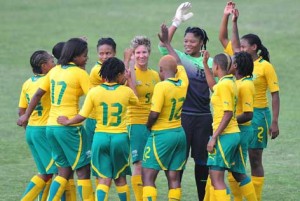 Boosted by a home crowd of 20,000 fans, including President Teodoro Obiang Mbasogo, Equatorial Guinea crushed South Africa 4-0 in the final of the 8th African Women’s Championship in Malabo on Sunday.
Boosted by a home crowd of 20,000 fans, including President Teodoro Obiang Mbasogo, Equatorial Guinea crushed South Africa 4-0 in the final of the 8th African Women’s Championship in Malabo on Sunday.
Banyana Banyana — as the team is affectionately known — held out until the 43rd minute when the home team took the lead through Chinasa’s header from a corner kick. The goal seemed to take the wind out of Banyana’s sails. After the break the qualitative difference between the two sides became evident. Midway through the second half Banyana lost their concentration, giving up three goals in six minutes to the Nzalang Nacional (Nation’s light): Costa (66′), Anonman (70′) and Tiga (72′).
“Falling at the final hurdle is a major disappointment to all involved with Banyana Banyana,” said head coach Joseph Mkhonza at the post-match press conference. In a year that saw South Africa’s women’s team reach two major milestones, competing in the Olympics for the first time and finally beating powerhouse Nigeria, Mkhonza looked ahead and said that “Banyana Banyana should be able to qualify for international tournaments, such as the World Cup and the Olympics, in the future.”
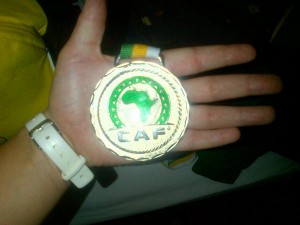 It is always tough to play a final against the host nation, but the big game in hostile territory did appear to get the best of the South Africans. The night before the match, for example, Banyana captain Amanda Dlamini (@Amanda_Dlamini9) shared her state of mind on Twitter. “I don’t know how I’m going to sleep tonight. If I’m going to sleep at all,” she wrote. Then a few hours before the match, defender Janine Van Wyk (@Janinevanwyk5), whose marvelous goal beat Nigeria in Wednesday’s semifinal, tweeted: “Very IMPORTANT game today. I’m so nervous its [sic] insane but I know we will do well.” Perhaps adding to the pressure of the moment, the office of the Presidency (@PresidencyZA) followed by tweeting its support: “President Zuma wishes Banyana well.”
It is always tough to play a final against the host nation, but the big game in hostile territory did appear to get the best of the South Africans. The night before the match, for example, Banyana captain Amanda Dlamini (@Amanda_Dlamini9) shared her state of mind on Twitter. “I don’t know how I’m going to sleep tonight. If I’m going to sleep at all,” she wrote. Then a few hours before the match, defender Janine Van Wyk (@Janinevanwyk5), whose marvelous goal beat Nigeria in Wednesday’s semifinal, tweeted: “Very IMPORTANT game today. I’m so nervous its [sic] insane but I know we will do well.” Perhaps adding to the pressure of the moment, the office of the Presidency (@PresidencyZA) followed by tweeting its support: “President Zuma wishes Banyana well.”
That Banyana could not field three overseas players partly explains Sunday’s result. Midfielder Kylie Ann Louw and reserve goalkeeper Roxanne Barker stayed in the United States due to study commitments, while midfielder Nompumelelo Nyandeni remained with her club in Russia. “Losing a player of Nyandeni’s talent and experience will always be a setback to any team,” said Mkhonza. Another factor to consider has to do with oil-rich Equatorial Guinea’s “willingness to hand out passports to players who agree to play for them without any period of residency,” as Ian Malcolm of goal.com put it. “Almost the entire squad selected for the African Women’s Championship were born outside Equatorial Guinea, most in Brazil, but also in other African states.” While not illegal according to FIFA rules, the ethics of this all-star team formation are questionable.
The buzz about Banyana from South Africans on social media was overwhelmingly positive. “You did South Africa proud, the whole team deserves a heroes welcome. You passed all expectation and showed your greatness,” @RhandzuOptimus wrote in a tweet that captured the general tenor of South Africans’ reactions. The government chimed in too. Sports Minister Fikile Mbalula said that “Although they did not win the (African) Championships, Banyana Banyana have proven that they are an ever improving team that has shown progress over the last year.”
Now that the tournament is over what will happen to the “Banyana Bandwagon”? Practitioners and fans know that women’s football in South Africa needs much more investment and support. Even at the elite level there is no season-long national league. And as Thabo Dladla, founding director of Izichwe Youth Football in Pietermaritzburg, explains in a comment to my previous Banyana post: “There are no competitions for girls junior teams. Our girls only start playing football at the university level. These issues have nothing to do with money. SAFA should play the role in terms of promoting the game.” The road ahead is long and tortuous. We’ll be following developments closely.
Suggested Reading
Prishani Naidoo and Zanele Muholi, “Women’s bodies and the world of football in South Africa,” in Ashwin Desai, ed., Race to Transform: Sport in Post-Apartheid South Africa (HSRC Press, 2010).
Cynthia Fabrizio Pelak, “Women and gender in South African soccer: a brief history,” Soccer and Society 11, 1/2 (2010); 63-78.
Martha Saavedra, “Football Feminine—Development of the African Game: Senegal, Nigeria, and South Africa,” Soccer and Society 4, 2/3 (2003): 225-253.
Banyana Bandwagon
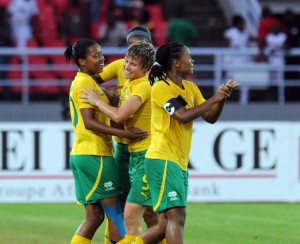 South Africa’s women’s national team recorded its most important victory ever on November 7 by defeating Nigeria 1-0 in the semifinal of the 8th African Women’s Football Championship in Bata, Equatorial Guinea. Defender Janine Van Wyk long-range blast gave Banyana Banyana (The Girls) their first-ever win against the six-time champion Super Falcons. South Africa will face Equatorial Guinea in the final on Sunday, November 11, a team that beat them 1-0 in the first group stage match.
South Africa’s women’s national team recorded its most important victory ever on November 7 by defeating Nigeria 1-0 in the semifinal of the 8th African Women’s Football Championship in Bata, Equatorial Guinea. Defender Janine Van Wyk long-range blast gave Banyana Banyana (The Girls) their first-ever win against the six-time champion Super Falcons. South Africa will face Equatorial Guinea in the final on Sunday, November 11, a team that beat them 1-0 in the first group stage match.
“I have been in the Banyana Banyana side since 2004 and we have tried for so long to beat the Nigerians but luck has never been on our side, but now we have proved that we can compete and beat of the best on the continent,” said Van Wyk. “At the CAF African Championship held in South Africa in 2010 I scored with a free kick from 35 metres out against Nigeria, and my teammates always remind me that I normally reserve my best for matches against Nigeria,” she laughed.
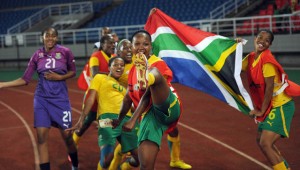 With the men’s team — Bafana Bafana — struggling, it is perhaps not surprising that South African fans and the football establishment are leaping onto the Banyana bandwagon. Following the win against Nigeria, SAFA President Kirsten Nematandani announced he would be flying out to attend the final. “The victory should open doors for the growth of women’s soccer,” he said. “Well done to the girls for making the country proud.”
With the men’s team — Bafana Bafana — struggling, it is perhaps not surprising that South African fans and the football establishment are leaping onto the Banyana bandwagon. Following the win against Nigeria, SAFA President Kirsten Nematandani announced he would be flying out to attend the final. “The victory should open doors for the growth of women’s soccer,” he said. “Well done to the girls for making the country proud.”
“We are in a very positive frame of mind going into the final game against the hosts,” said Joseph Mkhonza, the Banyana head coach. “But we are still focused on attaining our mission of taking gold in this tournament. We came here with a mission and that mission is still on track,” he said. “We have some homework to do before Sunday’s final, knowing we will play in front of a large red-clad crowd in what is certain to be a packed Malabo stadium, but we will be ready for the challenge.”
Fútbologia: Talking Football in Bologna
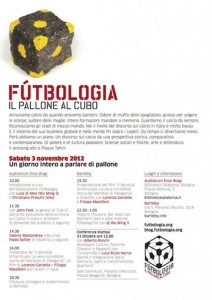
I caught the football virus early on in life. Growing up in Rome, some of my earliest memories of pure freedom and unadulterated joy had to do with playing football with my brothers, friends, and school mates in courtyards, playgrounds, streets and on the dirt and gravel pitches of Villa Ada and Villa Borghese. Eventually, I made it into the CONI Acqua Acetosa football academy, which in the 1970s was a bountiful feeder program for youth development programs across the city, including Roma and Lazio.
This was around the time of the Iranian Revolution and the U.S. Embassy hostage crisis (go see Argo if you haven’t yet). When our creative writing teacher demanded an essay on a global topic, I cheekily produced a (handwritten) lengthy fiction piece about an Iran vs. U.S. “peace match” in Tehran. I coreographed it tightly. President Carter and Ayatollah Khomeini sat next to each other in the VIP seats (!) and at the end of the match the unifying power of sport resolved the diplomatic crisis. Nothing like a young boy’s idealism and imagination!
These childhood memories were suddenly stirred up when I learned about “Fútbologia 2012” — a day-long gathering to be held in Bologna on Saturday, November 3. John Foot, lecturer in Italian history at the University of London and author of Calcio: A History of Italian Football will give a keynote address (follow him on Twitter @footymac) based on his book and the evolution of football writing in Italy and abroad.
I liked the emotional, unpretentious prose of the event’s official description, as well as its philosophical thrust. “We sniff football from when we are kids. The smell of mold in the dressing room, shoe polish, sweaty uniforms,” write the Fútbologia organizers. “Entire lineups memorized. We watch football since forever. We recognize stadiums from around the world. And yet the level of discourse on football in Italy is very modest. And its global business system is in deep shit. We’ve been having less fun for quite some time. But now we have a plan. A conversation about football from a historical perspective, comparative and contemporary. About power and popular culture. Social sciences and physical sciences, art and literature. High pressing and Tahrir Square.”
Now that’s what I call a Saturday well spent. Buon divertimento!
For more information visit the futbologia.org blog.